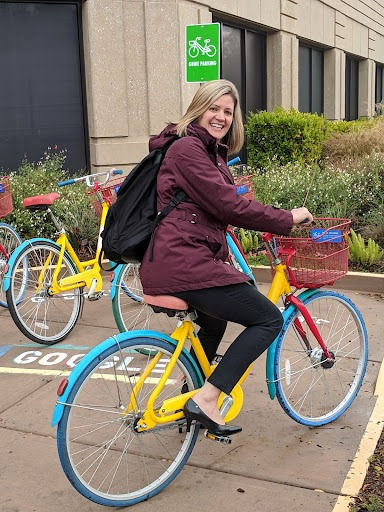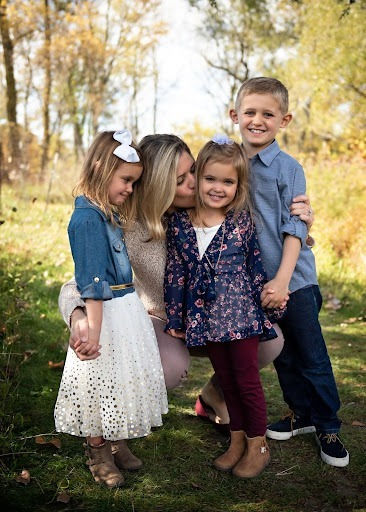Life with Allergies: How to Turn Limited to LimitLESS
- Allergy Force Insights

- Mar 3, 2022
- 6 min read
Updated: Jun 19, 2025
Allergy Force caught up with Lindsay Schultz, Founder of Feed Your Can after hearing her speak during a Food Allergy Awareness Week webinar hosted by the Mary H. Weiser Food Allergy Center. Her clarity, purpose and vision for empowering families on how to live with food allergies resonated. Loud and clear.

Lindsay struggled with the decision to leave a coveted role at Google — her dream employer for over 14 years — to focus on family and an entrepreneurial venture. Many of us have stood at similar junctures, torn between career and family aspirations, so we understand this struggle on a deeply personal level.
Eventually, Lindsay found the courage and resolve to take the leap. Today she’s a ‘be there’ mom for her three kids, as well as a start-up founder who’s helping food allergy families live their best lives.
Lindsay launched Feed Your Can in 2021 to help food allergy families live with a growth-mindset so they can thrive with food allergies. 2021 saw the launch of the Feed Your Can website and the development of content, courses, and podcasts.
What exactly is a GROWTH-MINDSET?
“When we change our beliefs, even in the smallest of ways, it can have a significant and positive impact on our lives.”
—Research findings from Carol Dweck, psychologist and Stanford professor
According to Dweck, "In a growth mindset, people believe that their most basic abilities can be developed through dedication and hard work—brains and talent are just the starting point. This view creates a love of learning and a resilience that is essential for great accomplishment.” (Dweck, 2015)
Lindsay is deeply inspired by the work of Carol Dweck. Lindsay explains that a growth-mindset, “takes challenges head-on and uses ‘failure’ moments as teachable moments to build into our character.” This mindset teaches us that we are more in control of our responses (and not always our circumstances) and it can guide us through stress, failure, and ultimately to happiness.
Takeaway for the food allergy community?
Our scary reactions build resilience, creative problem solving, strategic thinking, collaboration, strong communication and many other life skills that will serve us well for the rest of our lives…even in overcoming non-food-related struggles, as well.
“Life is not about how fast you run or how high you climb, but how well you bounce.”
—Vivian Komori, CEO, The Broad Perspective
Lindsay knew little about food allergies before she had a son with food allergies. “Looking back, there were some telltale signs — he always had itchy skin and eczema — but we chalked that up to sensitive skin,” Lindsay recalls.
Her son’s symptoms also included GI issues. As Lindsay and her husband tried to pinpoint underlying causes, they felt trapped in a labyrinth of trial and error. None of their son's specialists, though expert in their own fields, were able to connect the dots to reveal the full picture.
They didn’t land on ‘food allergy’ until their son reacted to a jar of mashed peas at 13-months. Within minutes of eating the peas he broke into hives, coughed uncontrollably and vomited. Lindsay recalls, “I was home alone. No Benadryl. No epi pen. His face turned bright red. The rest of his body became blotchy. I called 911.” EMS arrived within minutes and administered epinephrine and steroids. Follow-up bloodwork and scratch testing indicated allergies to peanuts, all tree nuts, eggs, legumes, mustard, sesame and soy protein.
Lindsay felt lost. Saddened. Scared. She was nervous about feeding her son and worried he’d have another reaction.
She didn’t know anyone else whose child had food allergies, so she turned to FARE and Kids with Food Allergies, and found a parent support group in her area. Asthma was also rearing its ugly head at the time and needed to be controlled. Already on medication for his GI and eczema issues, the thought of giving her son even more medication was disheartening.
In 2014 Lindsay delivered twin girls prematurely, adding more complexity to an already complex life. They were so early, so fragile, she didn’t even get to hold one of her daughters for the first two weeks of her life.
Lindsay and her husband juggled all this while working full-time in demanding, client facing roles that required extensive travel.
“When we hit a ‘wall’ (problem), we have the power to turn it on its side and form a bridge.”
—Lindsay Schultz
After the girls were born at 2 pounds each and struggled through their first months of life, Lindsay stepped ‘down’ on the career ladder at Google, taking a level, title and stock equity cut.
In time, the family discovered the twins also had food allergies, and in fact, their three kids had three different allergy profiles.
For five years Lindsay wrestled with definitions of success, happiness and ambition, as well as heavy feelings of guilt over conflicting family and career aspirations. How could she possibly leave one of the world’s best companies where she’d practically grown up? She was afraid that giving up a hard-earned career and coveted position would lead to later regrets.

“Yet I knew,” explains Lindsay, “that even with a ‘winning lottery ticket’ {aka, her career}, there was a deeper hole that needed filling.” She believed that leaning into food allergy with an empowerment twist (i.e., a growth-mindset) would help her family navigate their next chapters. She reflects, “As our kids grow older, I know we will lose the control of having them under our daily watch. Leaning into our community sooner rather than later will help prepare us for that time.”
Lindsay left Google in April, 2021.
Reflecting back on the decision, she explains, “Google fulfilled our lives for a long time, but as our family’s changing needs took more priority, I had to rearrange my values and where I wanted to spend my time. No regrets.” She jokes that she’s a ‘Type A in recovery’ from nearly 20 years in corporate America.
“Food allergies won’t limit us if we don’t let them.”
—Lindsay Schultz
“I’ve always been rooted in optimism,” reveals Lindsay, “thanks to my mom, a 40+ year special ed teacher who could always find a positive spin on hope and possibility.”
Difficult premature births and food allergies were not part of Lindsay's plan, but she learned to adapt, adjust and hold onto growth-mindset strategies more than ever as her gutsy career pivot and start-up launch prove.
Lindsay offers up some advice to families trying to navigate life with food allergies, grounded in her own lived experiences and perhaps more importantly, her unshakeable belief that food allergies won’t limit us if we don’t let them:
1. Honor your feelings.
For some, the process of grieving after a food allergy diagnosis is real. There are many stages until you get to acceptance. Even when you accept the diagnosis it doesn’t always get easier. Finding a supportive group of people who can match your ideal mindset, be steps ahead of your journey, and share helpful experiences is productive.
2. Trust the struggle and see it as growth.
All of the emotions you experience need to happen. It’s definitely a roller coaster and you learn that you definitely grow through what you go through. As a first-time parent, if you were handed a kindergartener at birth, would you know what to do? Absolutely not! You’re not there…YET. Each new hurdle forces growth and you can choose to take the best of it and build it into your character, instead of feeling frustrated that this is your struggle.
3. Don’t borrow future trouble.
Future worries are real as you look ahead at each age and stage and start shutting down possibilities for how your child is going to live fully and freely with food allergies. This is your brain’s way of protecting you. But that is not the rational part of your brain that will allow you to be reasonable in practice. You have an incredible capacity to navigate each stage. As you approach each new milestone, you can be intentional about problem-solving and figure out ways to adjust.
4. Lean on the wisdom of caregivers who have gone before you.
You may feel alone in your circles of family, friends and acquaintances, but there is a giant community of support in this food allergy journey. Surrounding yourself with the right energy and expertise will let you envision healthy futures full of possibilities for handling new situations.
“When we stop at the problem, we’re just whining. When we focus on constructive workarounds, we’re empowered. LimitLESS.”
—Lindsay Schultz
Feed Your Can is a venture to watch. Think of the ‘can’ as one part possibility, one part trash can — it's about feeding possibilities and trashing limiting beliefs. Follow Feed Your Can on Instagram or Facebook, sign up for their quarterly newsletter, or email Lindsay at lindsay@feedyourcan.com to learn more about course offerings and toolkits under development.
The all-in-one food allergy app that empowers you to
live your best life with food allergies
The Allergy Force Changemaker Series shines a light on movers and shakers in the food allergy community who drive change and make a positive difference for the entire community.
Images: Courtesy of Feed Your Can







Comments